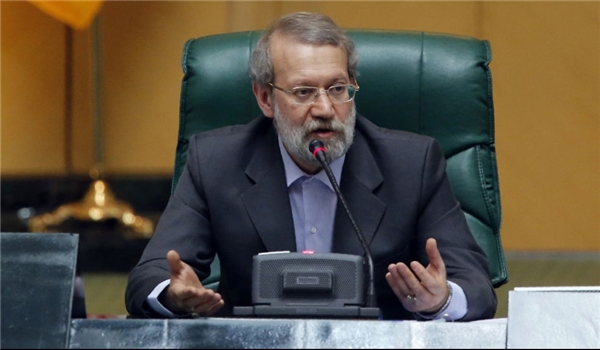
Next Budget to Address Economic Concerns


Larijani said that Iran will focus on non-oil exports in the new Iranian year, adding that the parliament is working on the issue of non-oil exports in planning the budget bill.
He noted that the issues of national production, housing industry, as well as subsidies for the poor are top priorities of the country's budget.
The parliament speaker said that if the issue of national production is resolved, the unemployment rate will be reduced for sure.
Earlier this month, on December 8, Head of Iran's Management and Planning Organization Mohammad Baqer Nobakht said that planners have focused on reducing the pressure posed by US sanctions on Iranians’ lives in the budget bill for the next Iranian calendar year.
In a press conference to unveil the budget bill to reporters, Nobakht said the government had put a huge amount of energy into developing a "just and transparent bill”.
According to Nobakht, the next year's budget is 12% more than the budget for the current Iranian year (21 March 2018-2019), adding that it would envisage a total spending of around 433 quadrillion rials ($103 billion) from various sources including taxes, divesting state-run shares and selling oil.
Meanwhile, the budget bill expects 27 percent dependence on oil revenues and forecasts 1.5 million barrels of oil sales per day at the price of $54 per barrel. It also requires the government to allocate $14 billion (at the exchange rate of 42,000 rials) to supply of basic goods to back Iranians’ livelihood amid the US unilateral sanctions. To this end, it also mandates the allocation of 1.42 quadrillion rials for paying subsidies whether in cash or in form of basic goods to qualified Iranians.
Deputy of Iran’s Budget and Planning Organization Hamid Poormohammadi who accompanied Nobakht in the conference said for his part that the bill was mainly focused on Iranian’s livelihood, domestic production, and supporting environment and improvement of science in the country, as well.
A week before that, Nobakht had said the developers of the bill had had in mind some major points including reducing the pressure posed by US sanctions on Iranians’ lives, supplying basic goods, and paying a specific attention to domestic production and job creation.
Early in November, Governor of Central Bank of Iran (CBI) Abdolnasser Hemmati said that the US has failed in its efforts to cut Iran’s oil revenues to zero with sweeping sanctions, while the country is ready to combat even worse conditions.
Hemmati made the point posting a message on his Instagram page, underlining that it is no secret any more that the US has failed to carry out its earlier threats to push down Iran’s oil sales to zero under various pretexts.
“The Central Bank of Iran has developed various plans to cope with the worst-case scenarios after the second round of the US sanctions is carried out. Meanwhile, we have managed to build up our foreign exchange reserves over the past months,” he said.
According to Hemmati, the Central Bank of Iran has been focused mainly on stabilizing foreign-exchange market over the past few weeks through promoting Iran’s national currency.
“I’m sure that the great Iranian nation will leave behind successfully the current volatile situation. We are now developing new plans to restore balance to the market and prevent from further inflation,” he noted.
Late in October, Iran's Economy Minister Farhad Dejpasand downplayed the US November-4 sanctions against Tehran, stressing that his country has planned proper and effective measures to confront them.
In a related front on the same day, Iranian First Vice-President Eshaq Jahangiri assured the nation that the US November-4 sanctions would not leave any tangible impacts on the country, playing down Washington's attempts to stop Iran's oil exports.
"The government declares honorably that the US will not be able to stop Iran's oil sale," Jahangiri said, addressing a forum in Tehran.
"The Iranian nation should know that nothing will happen with the second stage of the (US) sanctions; they (the Americans) did whatever they could in the past few months and we have adopted the necessary measures (to confront them)," he added.
Jahangiri addressed the US officials, saying that the only way before them is interaction and talks without any bullying.


Newmont nets $100M payment related Akyem mine sale

First Quantum scores $1B streaming deal with Royal Gold

Caterpillar sees US tariff hit of up to $1.5 billion this year

Gold price rebounds nearly 2% on US payrolls data

Goldman told clients to go long copper a day before price plunge

Australia pledges $87M to rescue Trafigura’s Nyrstar smelters in critical minerals push

Copper price posts second weekly drop after Trump’s tariff surprise

One dead, five missing after collapse at Chile copper mine

Idaho Strategic rises on gold property acquisition from Hecla

Codelco seeks restart at Chilean copper mine after collapse

US slaps tariffs on 1-kg, 100-oz gold bars: Financial Times

BHP, Vale offer $1.4 billion settlement in UK lawsuit over Brazil dam disaster, FT reports

NextSource soars on Mitsubishi Chemical offtake deal

Copper price slips as unwinding of tariff trade boosts LME stockpiles

SAIL Bhilai Steel relies on Danieli proprietary technology to expand plate mill portfolio to higher steel grades

Alba Discloses its Financial Results for the Second Quarter and H1 of 2025

Australia weighs price floor for critical minerals, boosting rare earth miners

Australia pledges $87M to rescue Trafigura’s Nyrstar smelters in critical minerals push

Fresnillo lifts gold forecast on strong first-half surge

US slaps tariffs on 1-kg, 100-oz gold bars: Financial Times

BHP, Vale offer $1.4 billion settlement in UK lawsuit over Brazil dam disaster, FT reports

NextSource soars on Mitsubishi Chemical offtake deal

Copper price slips as unwinding of tariff trade boosts LME stockpiles

SAIL Bhilai Steel relies on Danieli proprietary technology to expand plate mill portfolio to higher steel grades

Alba Discloses its Financial Results for the Second Quarter and H1 of 2025

Australia weighs price floor for critical minerals, boosting rare earth miners

Australia pledges $87M to rescue Trafigura’s Nyrstar smelters in critical minerals push

Fresnillo lifts gold forecast on strong first-half surge














